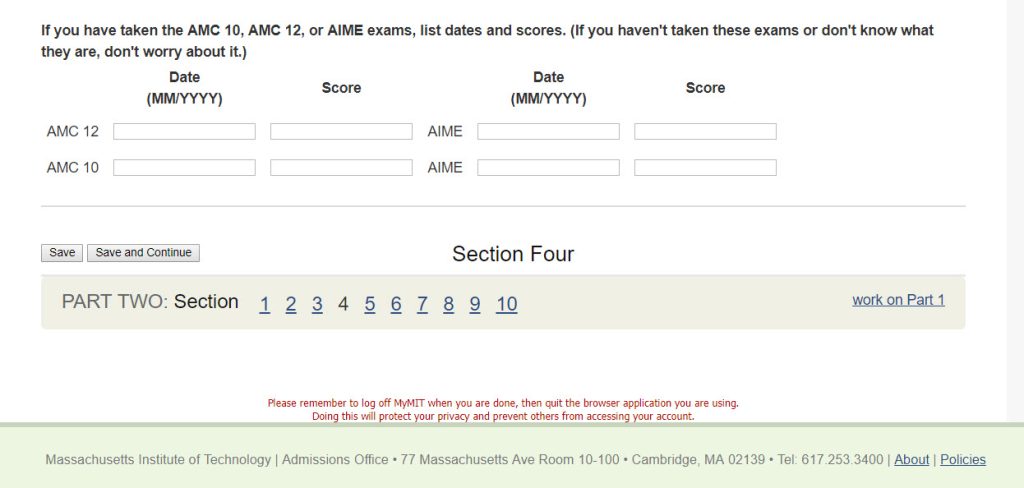American Mathematics Competition (AMC)
How the AMC can help you get into the Ivy Leagues.


1. Why the AMC is more important than the SAT
If you’re serious about the Ivy Leagues/top US colleges, esp. top STEM schools such as MIT, Caltech and Stanford, you should be focused as much on the AMCs as you are on the SATs. If fact, we think the AMC is more important.
The SAT doesn’t differentiate students very well. It behooves college board to increase the number of students who take the SAT, there is already an inflationary bias built in. Let’s look at the numbers:
The number of students who took the SAT in 2016: 7.3 million students – a 10% increase from the previous year. The class of 2017 is the largest cohort in SAT history. So, if you scored in the top 1% of test-takers last year, you would 1 of 73,000 students. And the numbers are likely to continue going up.
However, the AMC is run by the Mathematical Association of America; a non-profit managed by volunteer mathematicians. They care about preserving the integrity and quality of the test, seeking to challenge students. So, there is a strong deflationary bias built in. Let’s look at the numbers:
The number of students who took the AMC 12 this past year: 44,915. In 2016, the AMC 12 had 57,939 test-takers. And in 2015, there were 55,833 test-takers for the AMC 12. Not many and they’re not increasing. The MAA also regularly increases the difficulty of the tests some years to keep the passing threshold tight. So, if you make it to the AIME, you’re in the top 5% or 1 of only 2,245 students.
So, what will demonstrate academic excellence to the admissions officers at MIT more, being 1 of 73,000 students or 1 or 2,245? MIT usually has about 20,000 applicants a year, so you can bet that having the best SAT score will NOT make you stand out.


2. How the AMC can help you get into the Ivy Leagues
Another reason the AMC is so important is that the top schools now explicitly ask for AMC scores (not required).
Here are screen shots of the Caltech application:


The second image is a screen shot of the entire page where they have a section for AIME scores as well.
Here is the MIT application:



3. What is the AMC?
The American Mathematics Competition (AMC) is the first in a series of competitions to determine the US representative team for the International Mathematical Olympiad (IMO).
The AMC 8 is for students in grades 8 and below
The AMC 10 is for students in grades 10 and below
The AMC 12 is for students in grades 12 and below
So high school students would be focused on AMC 10 and 12. However, most of the students who score well tend to start in the 6th grade with the AMC 8.
If you score well, you make it to the American Invitational Mathematics Examination (AIME). To catch the eyes of admissions officers at MIT and Caltech, you’ll need to make it this far and score well on the AIME.
For real math superstars, a top score on both the AMC and AIME will lead to an qualification status for the United States of America Mathematical Olympiad (USAMO). If you are an International student, you cannot participate on the US team, but you can still get the USAMO qualification, which will really set you apart on your college applications.
4. How to prepare for the AMC
The hard part of preparing for the AMC your first time is that it’s not really a math test. It’s not the type of stuff you see in school. The actual math you need to do well on the test is rudimentary. Not super advanced stuff. However, AMC questions are more like problem-solving tests that will stretch your imagination and skills to the limit.
The best site for preparing for the test are
1. https://www.maa.org/math-competitions/amc-resources
2. https://artofproblemsolving.com/
Buy the resources and practice, practice, practice. A better way is to for a Math Competition Team at school, ask your math teacher to coach you and work together. An advantage to this approach is that you can then compete in other competitions, especially the ARMLs and HMMT, which are team-based math competition. These are two are also favored by top schools so creating a team will do wonders for your Ivy League chances.


Arguably, the best option is to train 1on1 with a tutor who has been there before and excelled on the tests. At IvyZen, we have a full team of AMC/AIME instructors, all of whom have qualified for the USAMO. Kevin Ham, our Academic Director who leads the team, is Cornell engineering graduate with over 10 years of AMC/AIME tutoring experience. He has personally tutored over 100 students during the past 10 years who have made it to AIME. Among these, over 20 have qualified for the USAMO. These superstars have gained admissions to all the top colleges including MIT, Caltech, Harvard and Stanford.
Due to high demand, our team of instructors works only with a limited number of students who are dedicated and show promise. If you are interested in working with an IvyZen tutor, please sign up…. An IvyZen Director will contact you within 12 hours and provide a free mock test as well as a full evaluation of the test results.


5. Ivy League Success Stories


A case study by Alex Loveless, Managing Director at IvyZen
I encountered Matthew (fake name) through a referral from a previous student’s mother, and from the first time I met him, I knew that he was a math guy. In my initial consultation with him, I noticed how each of his answers were calculated and rational, and judging by his appearance, he definitely wasn’t the artistic type.
When he told me that his favorite subject was math, I wanted to know more about why he liked the subject so much. In my years of experience, I’ve met many students who like math, but after I prod them for their reasoning, the usual explanation that I get is that they like math because they’re good at it, but not Matthew. He seemed to genuinely like the process of problem solving, and the objective nature of math solutions satisfied him much more than the opinion papers he wrote in English class. I knew that he would be perfect for the Number Theory Theme.
At IvyZen, we stress the importance of themes because we know that it works. Without a theme, students are rudderless and look confused and unappealing to the college admissions officers at top schools. The number theory theme was perfect for Matthew for a number of reasons: 1) he seemed more interested in math research than going into finance and making a lot of money, 2) he was already part of his school’s math club, and 3) he actually enjoyed learning about mathematics.


The first thing we did was shed most of his non-math/science related activities and focus on the ones that were on point. The first target was his math club, which sounded disorganized and without purpose. I told him that he needed to make suggestions for change within the group: focus on competitions, e.g. AMC, ARMLS, take practice tests, approach the AMC in a serious manner, participate in regional math competitions. I coached him on how to present these club changes in a palatable way. In his campaign, he not only highlighted how academic success on a regional or national (AMC) stage would benefit each club member in the college application process but also appealed to their competitive spirit. Matthew was made math club team captain and he lead them to distinguished rankings in two regional math competitions and to outstanding AMC test scores. The Math club experience dramatically bolstered Matthew’s resume in terms of leadership, but he was still lacking in the scholarship department.
The next project we started was a number theory research paper that would showcase his desire to learn more about theoretical math. After a few weeks of deliberation, we decided to pursue a paper on Aliquot fractions (Egyptian fractions) because he loved the idea of attempting to solve an unsolved math conjecture. In a high school research paper, we obviously didn’t expect to solve a problem that the greatest minds of the world had yet to solve, but the process of attempting different proofs excited Matthew. Through this research paper, we were able to demonstrate, in a tangible manner, just how enthusiastic and determined he was to deepen his knowledge of math at the university level.




Matthew’s Profile
1. Theme: Number Theory
2. The numbers:
GPA: 3.8
SAT I (old): 2350
AMC 10: 128 / AIME: 7
AMC 12: 141 / AIME: 8
3. Activities:
Leadership Activities: Math Club Captain, ARML Team Captain
Academic Activities: Number theory research paper, Cryptography research project, The Ross Program
Accepted to Caltech early
The most common mistake students make in their applications is presenting a well-balanced profile rather than focusing on a unique theme.
